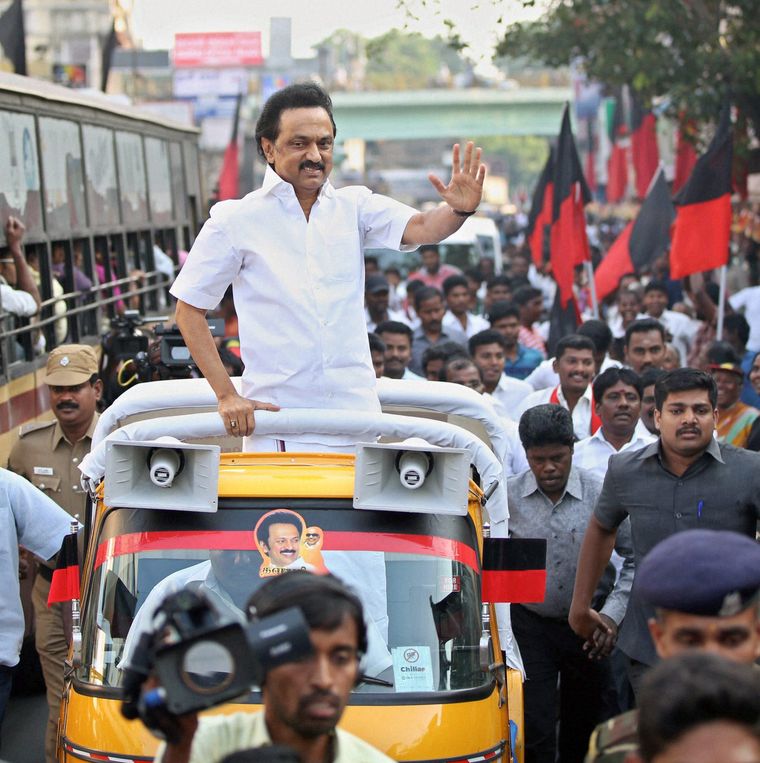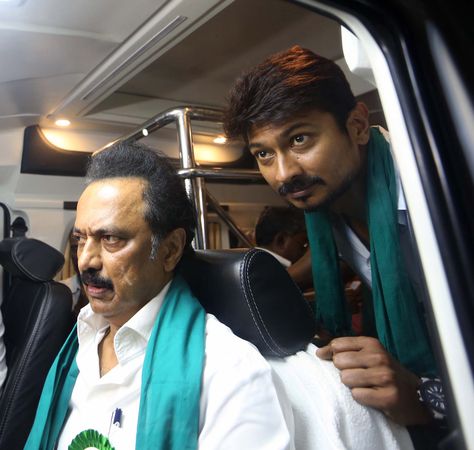DMK working president Stalin is reaching out to both party workers and the public
On March 21, Tamil Nadu opposition leader M.K. Stalin sent a two-page letter to chief ministers of non-BJP-ruling states, criticising the fiscal policy of the Union government and pointing out how the BJP’s moves would affect the fiscal autonomy of the states. His letter set the tone for a conclave of finance ministers of south Indian states. After taking over as the DMK’s working president in January 2017, Stalin has recast himself as a people’s leader in Tamil Nadu politics. His Cauvery protests, the #GoBackModi protests and the black flag protests against the governor were well received by the public.
Stalin’s smooth elevation was the logical progression of the plan that his father and DMK patriarch M. Karunanidhi had set in motion. Opposing voices in the family fell silent, after it became clear that Karunanidhi wanted this to happen. From the age of 14, he has been in the heat and dust of Dravidian politics. But, his elevation to the top came only after 50 years of work on the ground. And, now, at the age of 65, he is the undisputed leader of the DMK.
After taking over, he has revamped the party. In February 2018, Stalin turned his attention towards intra-party affairs and the internal bickering. He has travelled across the state to meet with the cadre, and heard them out. He set up drop-boxes to receive anonymous complaints from the cadre. A committee, headed by lawyer N.R. Elango, has been tasked to look into the complaints received through the box.
Stalin has constituted a three-member committee comprising DMK leaders T.R. Baalu, T.K.S. Elangovan and S. Austin to look into the organisational set-up of the party and come out with suggestions. He has also created a dedicated IT wing for the party and appointed 429 members to it. The number is expected to increase soon.
Like Karunanidhi, Stalin, too, also has been facing questions about dynasty politics for promoting his son Udhayanidhi Stalin. But, about Udhayanidhi’s apparent rise in the party, Stalin said, “There are many Udhayanidhis in the DMK, who rose from the ranks. For him also, this is the case.” Stalin’s elder brother and Madurai strongman M.K. Alagiri, who was banished by Karunanidhi in the 1980s and then taken back, has been silent since his father became ill. Alagiri, apparently, is not very active in the party. But, sources said he is getting ready to oppose Stalin. There are also murmurs in party circles that Stalin is not inclusive and is intolerant about criticism stemming from within the party.
These days, Stalin is vocal against the BJP government at the Centre. He tweeted in support of Mamata Banerjee’s efforts to create an anti-BJP third front. Reportedly, the DMK is drifting away from the Congress. The most visible moment came when it chose to stay out of the Congress-led impeachment motion against Chief Justice of India Dipak Misra in the Rajya Sabha. On April 29, Telangana Chief Minister K. Chandrasekhar Rao met Stalin in Chennai. This was perceived as a move to forge a non-Congress, non-BJP front, by bringing all regional parties together. But, at the news conference that followed the meeting, KCR and Stalin dismissed the idea of such a front.
However, KCR’s visit irked parties friendly with the DMK. “I am afraid that attempts to sideline the Congress and build a third front will pave way for the return of the BJP,” said Thol Thirumavalavan, president, Viduthalai Chiruthaigal Katchi.



கருத்துகள்
கருத்துரையிடுக